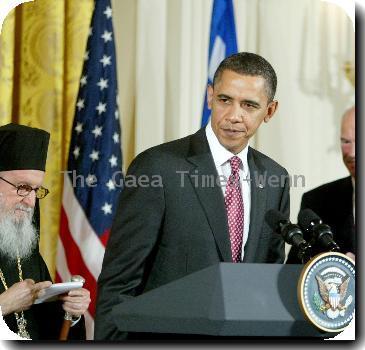Iran leader rejects nuclear charges, invites Obama to join in abolishing weapons on UN stage
By Charles J. Hanley, APMonday, May 3, 2010
Iran leader rejects nuclear charges on UN stage
UNITED NATIONS — Iran’s President Mahmoud Ahmadinejad on Monday rejected allegations his country is developing nuclear weapons, saying Washington has offered not “a single credible proof.”
In the first day of a monthlong conference reviewing the Nuclear Nonproliferation Treaty, Ahmadinejad dismissed charges that Tehran’s uranium enrichment program is designed to produce bombs, long-standing suspicions that are leading the U.S. and others to seek another round of U.N. economic sanctions against Iran.
Addressing delegations of 189 treaty nations, the Iranian leader denounced the Obama administration’s refusal to rule out the use of U.S. nuclear weapons.
“Regrettably, the government of the United States has not only used nuclear weapons, but also continues to threaten to use such weapons against other countries, including Iran,” Ahmadinejad said.
He referred to the new U.S. Nuclear Posture Review’s provision retaining an option to use U.S. atomic arms against countries not in compliance with the nonproliferation pact, a charge Washington lays against Iran.
Ahmadinejad also invited U.S. President Barack Obama to join a “humane movement” that would set a timetable for abolishing all atomic arms, weapons he called “disgusting and shameful.”
As the Iranian president spoke, the U.S. delegation, of working-level staff, walked out of the General Assembly hall, as did several European delegations, including the French and British.
U.S. Secretary of State Hillary Rodham Clinton, scheduled to follow Ahmadinejad to the U.N. stage later Monday, suggested over the weekend he was coming to New York “to divert attention and confuse the issue.”
“We’re not going to permit Iran to try to change the story from their failure to comply” with the NPT, she said on Sunday’s “Meet the Press” on NBC.
She was expected to announce a new U.S. initiative on stockpile “transparency” that would provide previously undisclosed details about the size of the U.S. nuclear arsenal.
Opening the conference, U.N. Secretary-General Ban Ki-moon directly challenged Tehran.
“The onus is on Iran to clarify the doubts and concerns about its program,” the U.N. chief told the delegates.
He called on the Tehran government “to fully comply with Security Council resolutions” demanding that it halt enrichment, which Washington and others contend is meant to produce the nuclear fuel for bombs in violation of Iran’s NPT obligations.
Later, Yukiya Amano, head of the U.N. watchdog International Atomic Energy Agency, said his inspectors could not confirm all of Iran’s nuclear material is devoted to peaceful activities. He called on Iran to “clarify activities with a possible military dimension.”
While delegates assess the state of the NPT in U.N. conference halls, American and European diplomats will be working elsewhere to reach agreement with the sometimes reluctant China and Russia on a fourth round of U.N. Security Council economic penalties to impose on Iran.
Ahmadinejad, the only head of state participating in the conference, complained that the U.S. and its allies were pressuring Iran “on the false pretext of probable diversions in their peaceful nuclear activities without providing even a single credible proof to substantiate their allegation.”
The Iranian leader reiterated his country’s support for establishing a nuclear weapons-free zone in the Middle East, an Arab-backed idea aimed at Israel’s unacknowledged nuclear arsenal of perhaps 80 bombs. He also called on the U.S. to dismantle its tactical nuclear weapons on NATO bases in Europe.
Ahmadinejad’s presence came at the start of a four-week diplomatic marathon meant to produce a consensus final document pointing toward ways to better achieve the NPT’s goals of checking the spread of nuclear weapons, while working toward reducing and eventually eliminating them.
The treaty is regarded as the world’s single most important pact on nuclear arms, credited with preventing their proliferation to dozens of nations since it entered into force in 1970.
Treaty members gather every five years to discuss new approaches to problems, by agreeing, for example, that the IAEA should be strengthened. The only countries that are not treaty members are India, Pakistan, North Korea, all of which have nuclear arsenals or weapons programs, and Israel, which has an unacknowledged nuclear arsenal.
At three of seven past conferences, delegates failed to produce a declaration, including in 2005, at a time when the U.S. administration, under President George W. Bush, was unenthusiastic about arms control talks.
Obama has steered the U.S. back onto a negotiating track, including with a new U.S.-Russian agreement to reduce their thousands of long-range nuclear arms. Despite that, Libran N. Cabactulan, the Philippine diplomat who is president of this 2010 NPT conference, said he finds the No. 1 goal of many treaty nations is to press the NPT nuclear powers — also including Britain, France and China — to move more rapidly toward disarmament.
Tags: Barack Obama, International Agreements, Iran, Middle East, North America, Nuclear Weapons, Tehran, United Nations, United States, Weapons Administration, Weapons Of Mass Destruction

